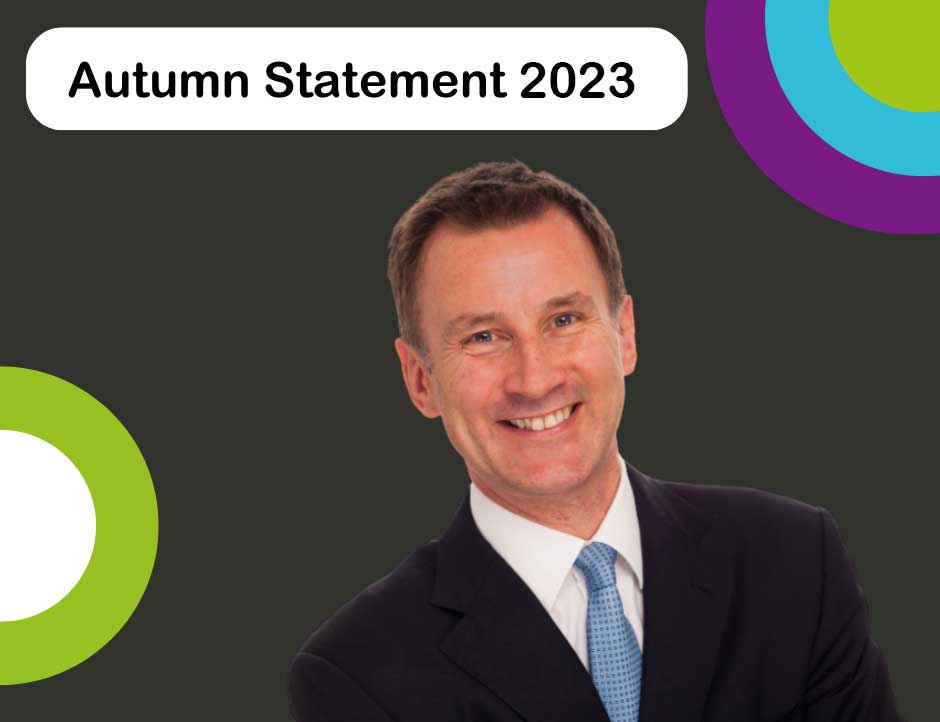Autumn Statement 2023
This week the Chancellor presented his Autumn Statement. This was an eagerly anticipated Statement, as we waited to see if he would act based on the recent positive financial results (lower inflation, improved GDP predictions, etc), or whether he would take a more cautious approach.
The Chancellor answered that question during his initial remarks where he talked about how the government has taken difficult decisions to put the economy back on track and halve inflation but “the work is not done”. He went on to say his priorities are to avoid big Government spending and high tax, and instead cut taxes and “reward hard work” with 110 “growth measures” for business.
So, what exactly was announced?
Business tax
“Full expensing” will be made permanent – the current scheme was due to expire in 2026. This allows firms to write off the entire cost of spending on new machinery and equipment, while also saving 25p from every pound spent on other types of investment.
A “new, simplified” tax relief for research and development will combine the existing R&D Expenditure Credit and SME schemes. Through that merged scheme, the Chancellor said he will also cut the rate at which loss-making companies are taxed from 25% to 19%.
The 75% discount on business rates – the tax paid on non-domestic properties – of up to £110,000 for firms in retail, hospitality and leisure will be extended for another year. The Chancellor claims this will save the average independent pub more than £12,800 next year.
Personal tax
The Government will expand and simplify the income tax cash basis for the self-employed and partnerships from 6 April 2024, following a consultation at Spring Budget 2023.
Individuals with income taxed only through Pay As You Earn (PAYE) will not be required to file a Self-Assessment return from 2024-25.
Wages and benefits
As pre-announced, the “national living wage” will increase by more than a pound an hour from April to £11.44. It will also be extended to 21-year-olds.
Benefits will be increased by 6.7%, and there will be tougher requirements for those who claim them to look for work.
The state pension will be increased by 8.5%.
The Chancellor says he will raise the local housing allowance, which has been frozen since 2020, in a measure worth £800 for some households next year.
National Insurance Contributions (NICs)
The main rate of Class 1 employee NICs will be reduced for employees from 12% to 10% from 6 January 2024. This will apply to earnings between £12,570 and £50,270 per annum.
The rate of Class 4 NICs, paid by the self-employed on earnings between £12,570 and £50,270 will be reduced from 9% to 8% from 6 April 2024. In addition, the Class 2 NICs, paid at a flat rate of £3.45 a week by the self-employed with profits above £12,570 will be abolished from 6 April 2024. At the same time, access to contributory benefits, including the State Pension will be maintained. Those with profits between £6,725 and £12,570 will continue to access benefits above through a National Insurance credit without paying NICs as they do currently.
VAT
The government will extend the zero rate of VAT on Energy-Saving Materials from 1 February 2024 by expanding the relief to include new technologies such as water source heat pumps and to bring buildings used for solely charitable purposes into the scope of the zero rate. Further details on the reforms will follow and the zero rate for all aspects of the relief is still due to revert back to a reduced rate (currently 5%) from 1 April 2027.
Making Tax Digital
The Chancellor confirmed that Making Tax Digital (MTD) will be going ahead for self-employed individuals and landlords with annual income over £50,000 from April 2026, followed by those with income over £30,000 from April 2027. The position of those with income below £30,000 is being kept under review.
Summary
Overall, this was generally a positive Autumn Statement, whilst at the same time not delivering any earth-shaking changes. It will be interesting to see what other developments happen as we move very much into election territory.
The change to National Insurance Contributions is certainly a positive move. It will also be interesting to see if the proposed timelines are maintained regarding Making Tax Digital. The launch of MTD has been pushed back several times already.
If you are unsure of the impact on you or your business, whether you will be better or worse off, please get in touch. We’d love to hear from you.





